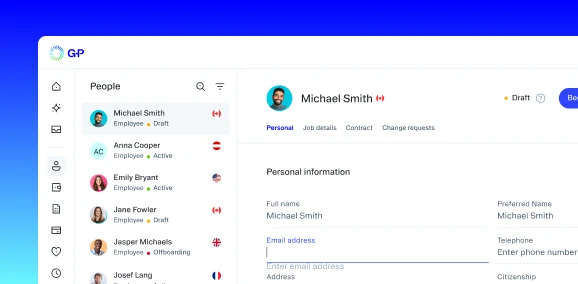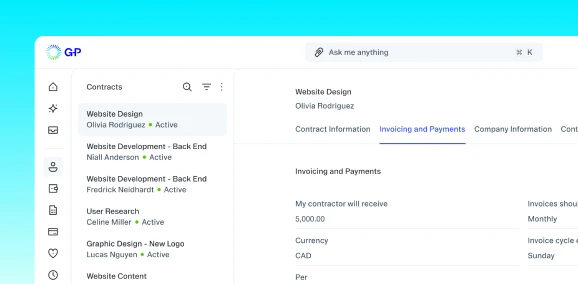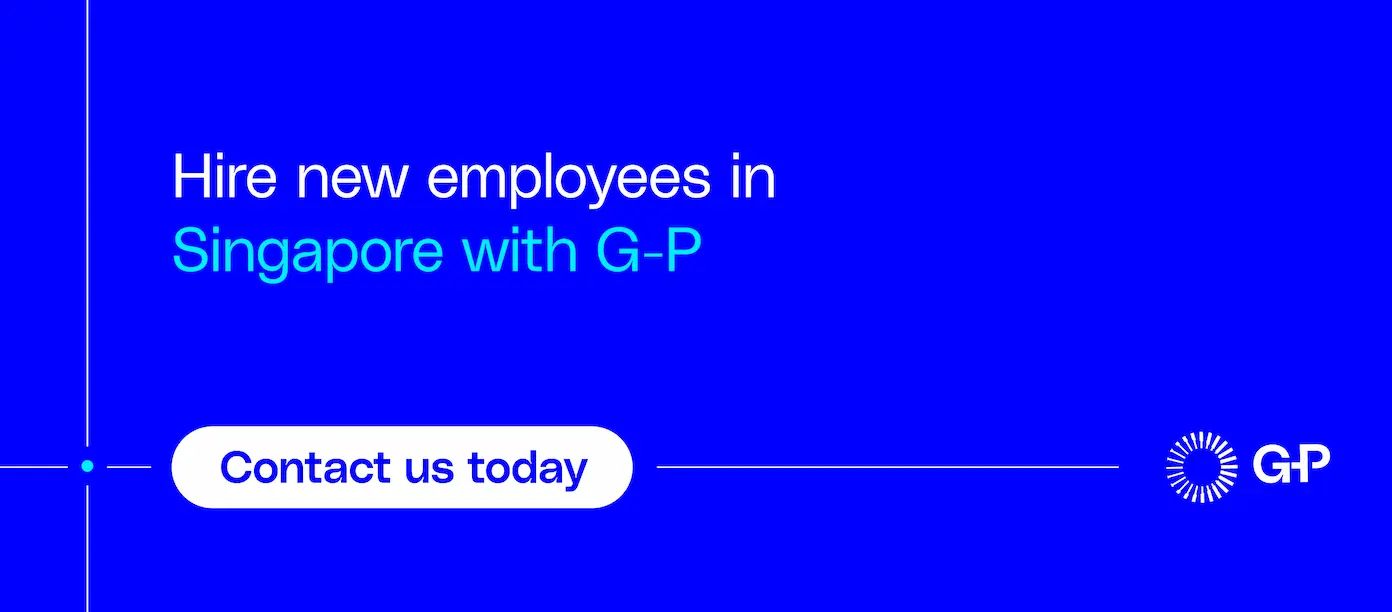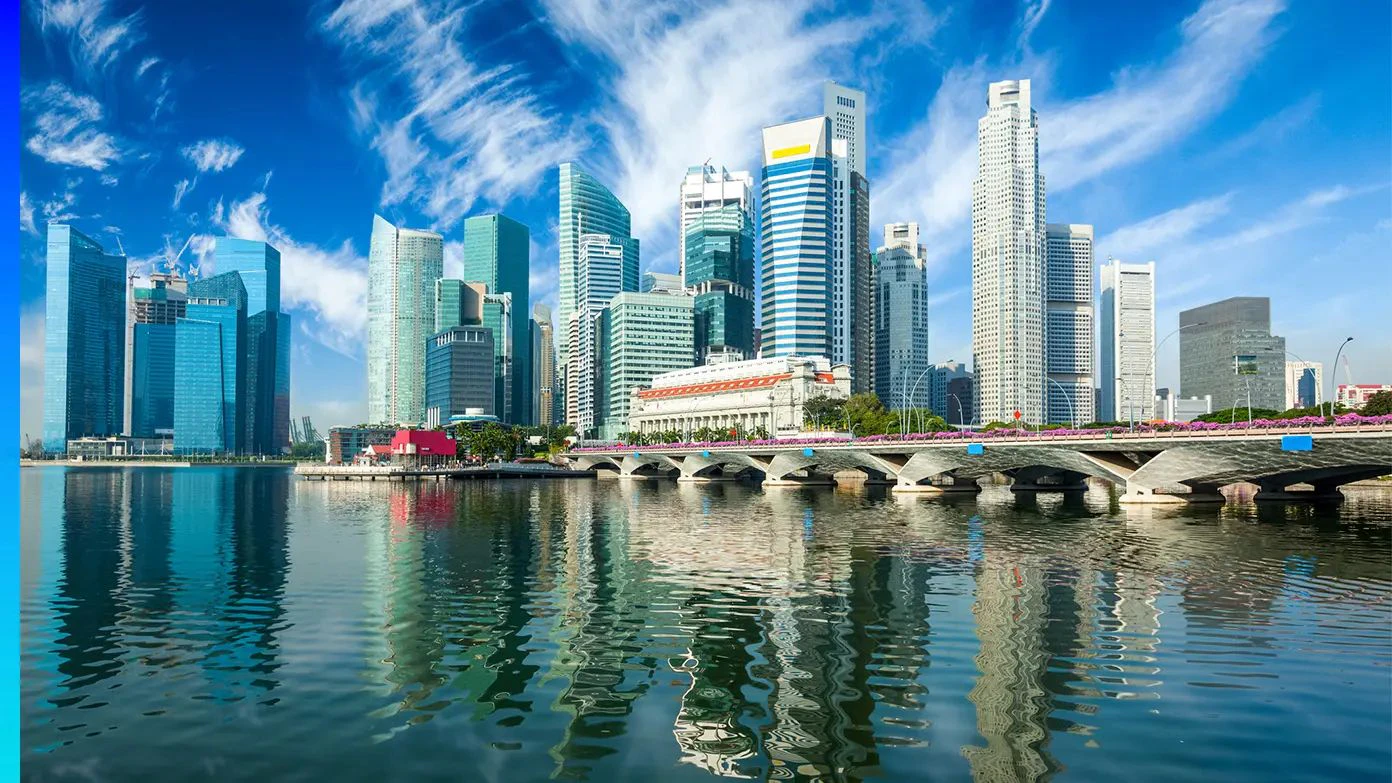Singapore is a great place to do business. Business-friendly regulations, legal system, and property rights protections consistently place Singapore at the top of the World Bank's “easiest place to do business" rankings. Industries include financial services, manufacturing, and supply chain management. The country’s top universities create a skilled talent pool for growing companies. English is the primary language used in the workplace, making communication easier across global teams.
Before expanding into Singapore, you’ll need to understand contracts, taxes, wages, benefits, and other employment laws. Our guide will tell you everything you need to know about hiring in Singapore.
What to know before hiring in Singapore
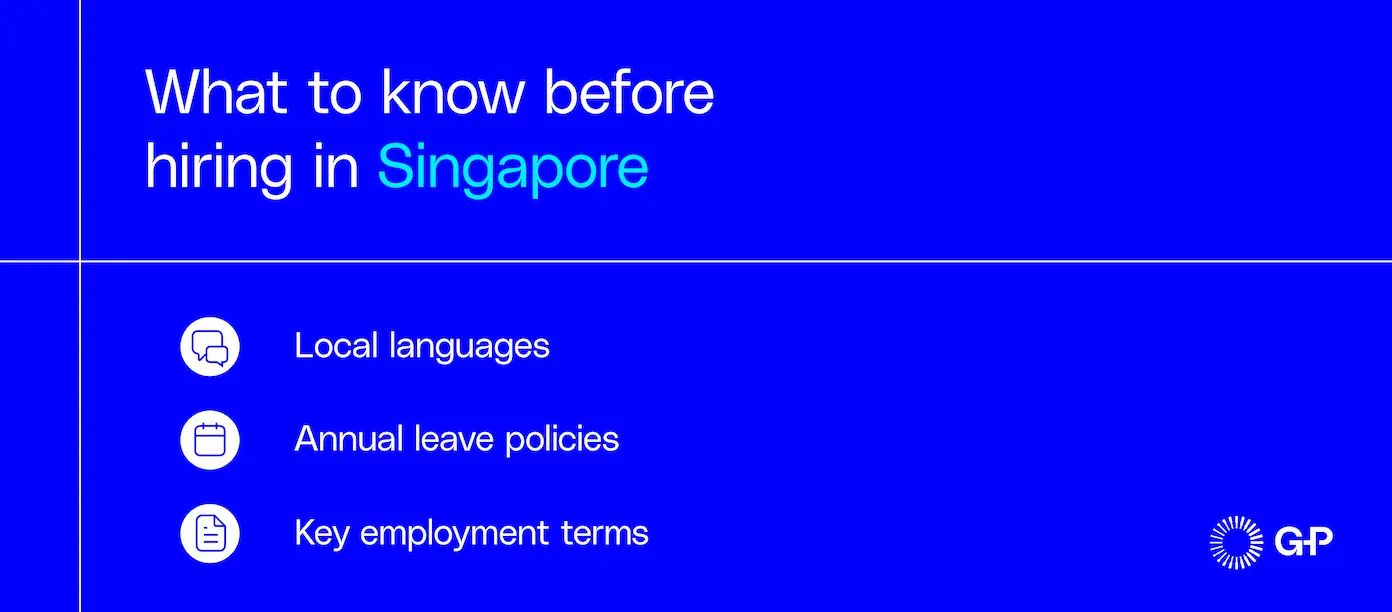
If you’re expanding your business into Singapore for the first time, there are important legal requirements to be aware of. These norms and laws influence hiring practices in Singapore and many aspects of the employer-employee relationship, including compensation and benefits.
G-P Gia™, our AI-powered global HR agent, can answer your toughest compliance questions across 50 countries — including Singapore — and all 50 U.S. states. Reduce your reliance on outside counsel and cut the time and cost of compliance by up to 95% with Gia.
Here are five things to know about hiring in Singapore.
1. Compensation and the workweek
Compensation in Singapore is competitive. In 2024, the median monthly salary for full-time workers was SGD 5,500. There’s no statutory minimum wage for most sectors, except for occupations covered by the Progressive Wage Model (PWM). These include cleaners, security officers, and landscape workers. Salaries are paid monthly and are accompanied by itemized payslips.
Employers need to make statutory contributions to the Central Provident Fund (CPF), Singapore’s social security savings scheme. CPF contributions are mandatory for all Singapore citizens and permanent residents who earn more than SGD 50 per month.
Employers in Singapore offer supplemental benefits to attract and retain talent. Common fringe benefits include:
-
Group medical insurance
-
Dental and vision coverage
-
Gym memberships
-
Transport and mobile phone allowances
-
Enhanced parental and family leave
-
Annual bonuses
The standard workweek is 44 hours, spread over five or six days. The maximum working day is nine hours for employees working five days or fewer per week. It’s eight hours for those working more than five days. Overtime is paid at a minimum of 1.5 times the hourly rate. Overtime hours are capped at 72 per month.
Employees get 11 paid national holidays. The exact dates for some holidays, such as Chinese New Year, Hari Raya Puasa, Hari Raya Haji, and Deepavali, vary each year based on the lunar or religious calendars.
2. Leave policies
The Employment Act governs annual leave. Employees who have worked at least three months for the same employer are entitled to paid annual leave:
-
Seven days of paid annual leave for the first year of service
-
An additional day for each subsequent year of service
-
Capped at 14 days per year from the eighth year onward
Unused annual leave can be carried over to the next year. You can offer more generous leave entitlements as part of your company policy.
Employees get up to 14 days of outpatient and 60 days of hospitalization leave per year (after six months of service). Mothers get 16 weeks of maternity leave and fathers get four weeks of paternity leave. Parents get six days of childcare leave every year if they have children under the age of seven.
3. Income tax and benefits
Singapore has a progressive income tax system. The tax rates start at 0% and increase to 24% for income over SGD 1M (as of 2024). Nonresidents are taxed 15% or the resident rates, whichever is higher. There’s no payroll tax, social security tax, or capital gains tax in Singapore. Employers don’t withhold income tax from employees’ salaries. Employees are responsible for filing and paying their own income tax annually.
The CPF is mandatory for Singapore citizens and permanent residents. CPF covers retirement, healthcare, and housing needs. Employer contributions range from 7.5–17% of wages, depending on the employee’s age:
-
17% for employees aged 55 or younger
-
15.5% for employees 55–60 years old
-
12% for employees 60–65 years old
-
9% for employees 65–70 years old
-
7.5% for those above 70
4. Key employment terms
Key Employment Terms (KETs) are important employment details that employers legally need to provide in writing. Employers issue KETs to all employees who are employed for a continuous period of 14 days or more. These must be sent within 14 days of the employment start date. KETs aim to provide clarity, transparency, and prevent disputes.
KETs include the following main items:
-
Full name of the employer and employee
-
Job title, main duties, and responsibilities
-
Employment start date
-
Duration of employment (for fixed-term contracts)
-
Working hours and rest days
-
Salary details
-
Overtime payment rates
-
Leave entitlements
-
Medical benefits
-
Probation period
-
Notice period for termination by either party
5. Local languages
Many Singapore locals speak two or more languages. English is the official language spoken in the workplace. Employment contracts, official documents, and workplace communications are typically in English. Other languages include Chinese, Malay, and Tamil.
2026 employee expectations in Singapore
Singapore has the highest levels of workforce anxiety out of our surveyed countries — 85% are concerned about job loss, 83% are worried their skills won’t be enough for an AI-powered workplace, and 62% are searching or likely to search for a new job.
This reflects the region's aggressive AI integration and dynamic labor market. Businesses hiring in Singapore should make AI upskilling and career security a central pillar of their employee value proposition. Clear communication about organizational growth is essential to tackle employee concerns and attract talent in this highly competitive market.
Top hiring hubs in Singapore
Singapore is a city-state. The country is one main urban hub for hiring. Knowing what each hub has to offer allows you to focus your hiring efforts in the right place and fill roles faster.
The top talent hubs in Singapore are:
-
Central Business District (CBD) is the main hiring destination for finance and business. It’s home to banks, law firms, and corporate headquarters.
-
Marina Bay Financial Centre is an extension of the CBD and is popular for financial institutions and tech companies.
-
One-North is a skilled talent pool for innovation and research. It houses tech, biomedical, media companies, and many startups.
-
Changi Business Park is known for tech, logistics, and financial services, especially those supporting aviation and IT.
-
Mapletree Business City attracts tech, media, and creative industries.
-
Jurong Innovation District is a growing hub for advanced manufacturing, robotics, and engineering.
Key industries in Singapore
Understanding Singapore’s main industries allows you to benchmark salaries and benefits. You can use this insight to make smart choices about where to invest and grow your workforce.
The main industries in Singapore include:
-
Financial services: Singapore is a leading center for banking, insurance, asset management, and fintech in Asia. Specialist talent includes fintech specialists, data scientists and data analysts, and cybersecurity professionals.
-
Information and communications technology (ICT): The country is a regional hub for software development, cybersecurity, data analytics, and digital services. Specialist talent includes AI and machine learning specialists, cybersecurity professionals, and data professionals.
-
Manufacturing: This sector includes electronics, engineering, chemicals, and aerospace. Specialist talent includes various engineering roles.
-
Logistics and supply chain management: Singapore’s location and port make it a leader in shipping, air cargo, and regional distribution. Specialist talent includes supply chain analytics specialists, digital transformation and automation specialists, and e-commerce logistics specialists.
-
Healthcare and biomedical sciences: The country is a center for pharmaceuticals, medical technology, biotechnology, and healthcare services. Specialist talent includes R&D scientists and researchers, clinical research professionals, and regulatory affairs specialists.
The cost of hiring an employee in Singapore
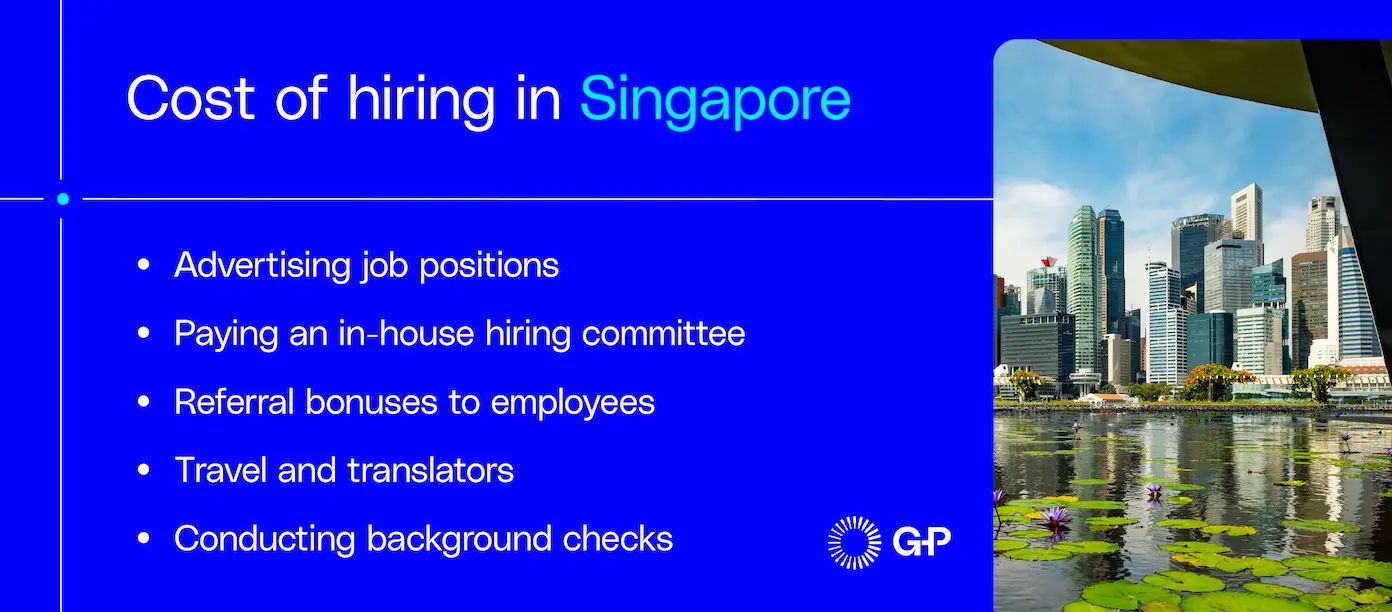
Whether you’re hiring one employee or an entire team in Singapore, expenses are inevitable. Budget for the following:
-
Setting up an entity (unless you partner with an employer of record)
-
Advertising job positions
-
Paying referral bonuses to employees with connections in Singapore
-
Paying an in-house hiring committee
-
Traveling to and from Singapore, including hotel stays, meals, and transportation
-
Partnering with a translator to draft documents or facilitate conversations (if applicable)
-
Costs for background screening, reference checks, and medical exams (common visa requirement for international employees)
-
Paying government fees for work pass applications (for international employees)
-
Drafting compliant employment contracts, legal review, and consultation with HR and legal experts
-
Providing computers, phones, and software licenses
-
Onboarding materials and initial training
-
Costs for maintaining tax and payroll records and documentation
According to G-P Verified sources from Gia, the employer burden rate in Singapore, which includes costs triggered on top of salaries, ranges from 7.5–17%, excluding accident insurance, which can vary.
What does a company need to do to hire employees in Singapore?
Make sure you cover these essentials before expanding your team in Singapore:
-
Register with the Accounting and Corporate Regulatory Authority (ACRA).
-
Get a unique entity number (UEN).
-
Register with the Inland Revenue Authority of Singapore (IRAS).
-
Set up a local bank account.
-
Register as an employer with the Central Provident Fund (CPF).
-
Prepare all statutory employment documents.
-
Make sure all KETs are in your employment contracts.
-
Stay compliant with the Personal Data Protection Act (PDPA).
Setting up a subsidiary in Singapore can take weeks or months. Use G-P EOR to hire full-time employees in Singapore without setting up your own entity. Build your team at a lower cost and with peace of mind that you’re doing so compliantly.
The steps to hiring in Singapore
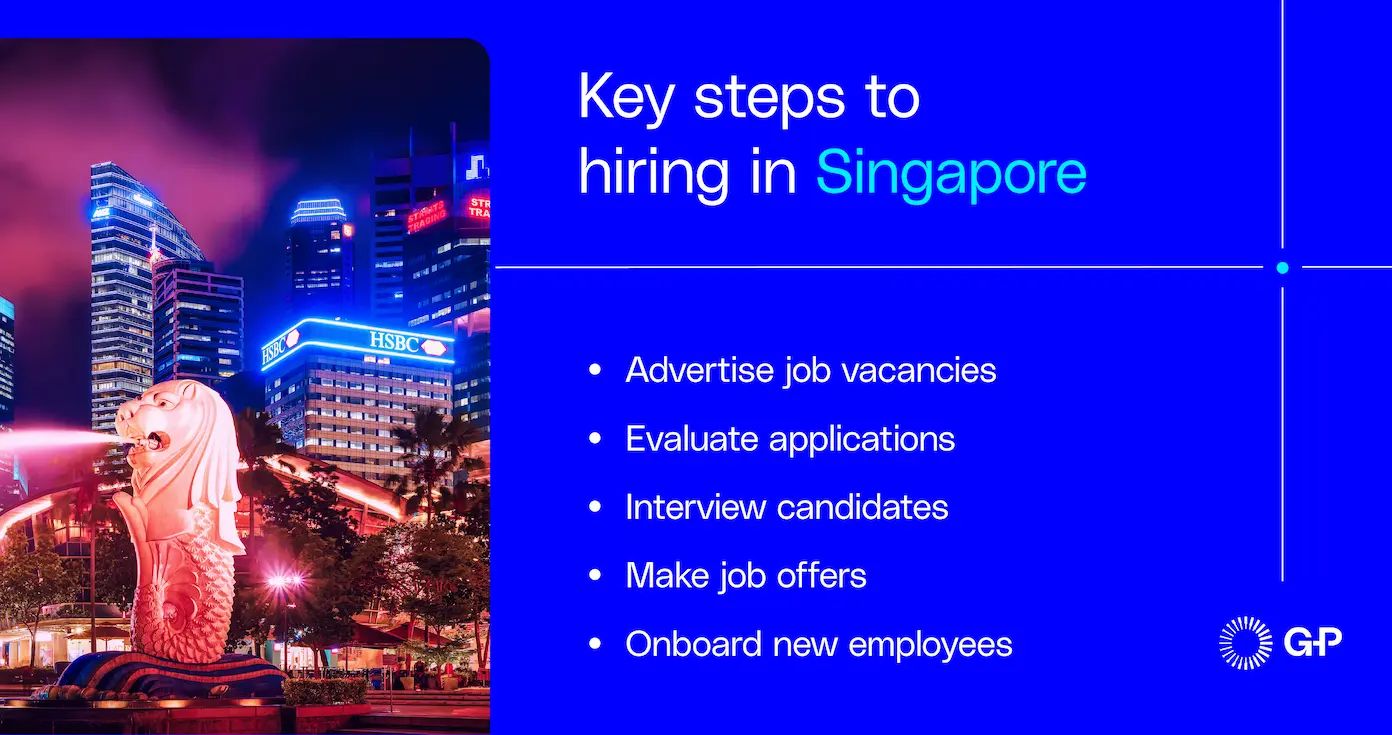
The hiring process in Singapore is similar to the one you’re likely familiar with in your own country. The hiring process follows five basic steps: advertising the job, evaluating applications, interviewing candidates, sending job offers, and onboarding new employees.
1. Advertise job vacancies
Your recruitment process has to be in line with the Tripartite Guidelines on Fair Employment Practices (TGFEP). Clearly outline the job description, responsibilities, qualifications, and selection criteria.
Employers are encouraged to prioritize local applicants. Most jobs (some exceptions apply) must be advertised on MyCareersFuture (the national jobs portal) for at least 14 calendar days before submitting an Employment Pass (EP) or S Pass application for an international candidate.
LinkedIn, Indeed Singapore, JobStreet, JobsDB, MyCareersFuture, and Glassdoor are popular hiring sites in Singapore.
2. Evaluate applications
Gather CVs and application forms. Screen candidates based on your published selection criteria. The Fair Consideration Framework (FCF) and TGFEP prohibit discrimination based on age, gender, race, religion, marital status, or family responsibilities.
3. Interview candidates
Interview candidates who made it onto your shortlist. Avoid any questions related to protected characteristics unless relevant to the job. Gia can help you create questions that follow antidiscrimination laws in Singapore, so you can find the best fit for the role while complying with local regulations.
4. Make job offers
Contact your chosen candidate to offer them a position with your company. Provide KETs within 14 days of employment commencement. KETs include details such as job title, salary, working hours, leave entitlements, and notice periods. Get consent for reference or background checks, and follow the Personal Data Protection Act (PDPA).
5. Onboard new employees
Now you can onboard new employees. Register the employee for Central Provident Fund (CPF) contributions, send itemized payslips, and make sure you’re compliant with all statutory benefits.
If you’re working with an EOR like G-P, you won’t have to worry about the administrative burden of onboarding. We’ll streamline the process, so you can focus on training your new hire and integrating them into your company culture.
Hiring contractors in Singapore
Working with independent contractors in Singapore can be a cost-effective way to test the market and build a presence without the commitment of full-time employees. Contractors based in Singapore understand local consumer behavior, rules, and business practices. They’ll be ready to start working quickly with their own equipment and established work processes.
Hiring contractors allows you to easily adjust your workforce based on your business needs, without the complexities and costs of employment.
Before you enter an agreement with an independent contractor in Singapore, consider the following:
1. Employees vs. independent contractors
It’s important to understand the difference between employees and independent contractors. In Singapore, employers hire employees to do work and, in return, pay them a regular salary and benefits. Independent contractors provide services. Unlike employees, contractors set their schedules, use their own equipment, and work on specific projects, rather than having an ongoing role.
2. Penalties for misclassification
Classifying someone as a contractor when they’re not can lead to severe penalties. If misclassification occurs, you’ll have to:
-
Pay all statutory benefits owed.
-
Settle any unpaid taxes or levies.
-
Risk prosecution for deliberate or fraudulent misclassification.
3. How to pay contractors in Singapore
G-P Contractor™ takes away the messy, time-consuming process of hiring and paying international contractors. You can create and issue contracts and pay contractors with just a few clicks, all while ensuring a compliant process.
Hire employees and contractors in Singapore with G-P
Our SaaS and AI-powered products – EOR, Contractor, and Gia – support companies as they build and manage global teams.
G-P is the recognized leader in global employment with more than a decade of experience; the largest team of HR, legal, and compliance experts; and a global proprietary knowledge base.
Make your expansion to Singapore easier with G-P. Contact us or book a demo today.
